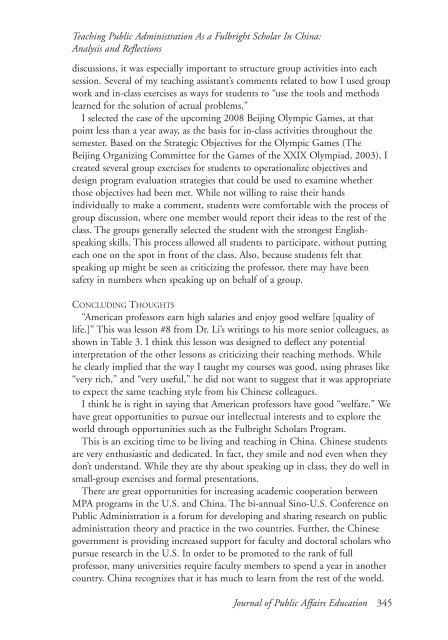JOURNAL OF PUBLIC AFFAIRS EDUCATION - naspaa
JOURNAL OF PUBLIC AFFAIRS EDUCATION - naspaa
JOURNAL OF PUBLIC AFFAIRS EDUCATION - naspaa
Create successful ePaper yourself
Turn your PDF publications into a flip-book with our unique Google optimized e-Paper software.
Teaching Public Administration As a Fulbright Scholar In China:<br />
Analysis and Reflections<br />
discussions, it was especially important to structure group activities into each<br />
session. Several of my teaching assistant’s comments related to how I used group<br />
work and in-class exercises as ways for students to “use the tools and methods<br />
learned for the solution of actual problems.”<br />
I selected the case of the upcoming 2008 Beijing Olympic Games, at that<br />
point less than a year away, as the basis for in-class activities throughout the<br />
semester. Based on the Strategic Objectives for the Olympic Games (The<br />
Beijing Organizing Committee for the Games of the XXIX Olympiad, 2003), I<br />
created several group exercises for students to operationalize objectives and<br />
design program evaluation strategies that could be used to examine whether<br />
those objectives had been met. While not willing to raise their hands<br />
individually to make a comment, students were comfortable with the process of<br />
group discussion, where one member would report their ideas to the rest of the<br />
class. The groups generally selected the student with the strongest Englishspeaking<br />
skills. This process allowed all students to participate, without putting<br />
each one on the spot in front of the class. Also, because students felt that<br />
speaking up might be seen as criticizing the professor, there may have been<br />
safety in numbers when speaking up on behalf of a group.<br />
CONCLUDING THOUGHTS<br />
“American professors earn high salaries and enjoy good welfare [quality of<br />
life.]” This was lesson #8 from Dr. Li’s writings to his more senior colleagues, as<br />
shown in Table 3. I think this lesson was designed to deflect any potential<br />
interpretation of the other lessons as criticizing their teaching methods. While<br />
he clearly implied that the way I taught my courses was good, using phrases like<br />
“very rich,” and “very useful,” he did not want to suggest that it was appropriate<br />
to expect the same teaching style from his Chinese colleagues.<br />
I think he is right in saying that American professors have good “welfare.” We<br />
have great opportunities to pursue our intellectual interests and to explore the<br />
world through opportunities such as the Fulbright Scholars Program.<br />
This is an exciting time to be living and teaching in China. Chinese students<br />
are very enthusiastic and dedicated. In fact, they smile and nod even when they<br />
don’t understand. While they are shy about speaking up in class, they do well in<br />
small-group exercises and formal presentations.<br />
There are great opportunities for increasing academic cooperation between<br />
MPA programs in the U.S. and China. The bi-annual Sino-U.S. Conference on<br />
Public Administration is a forum for developing and sharing research on public<br />
administration theory and practice in the two countries. Further, the Chinese<br />
government is providing increased support for faculty and doctoral scholars who<br />
pursue research in the U.S. In order to be promoted to the rank of full<br />
professor, many universities require faculty members to spend a year in another<br />
country. China recognizes that it has much to learn from the rest of the world.<br />
Journal of Public Affairs Education 345
















